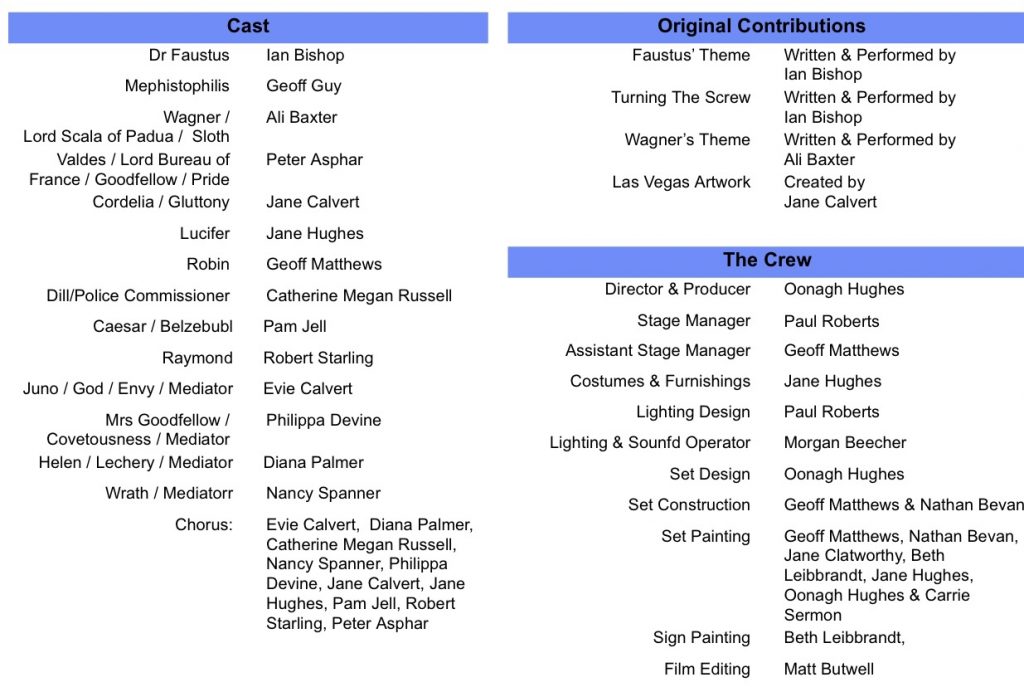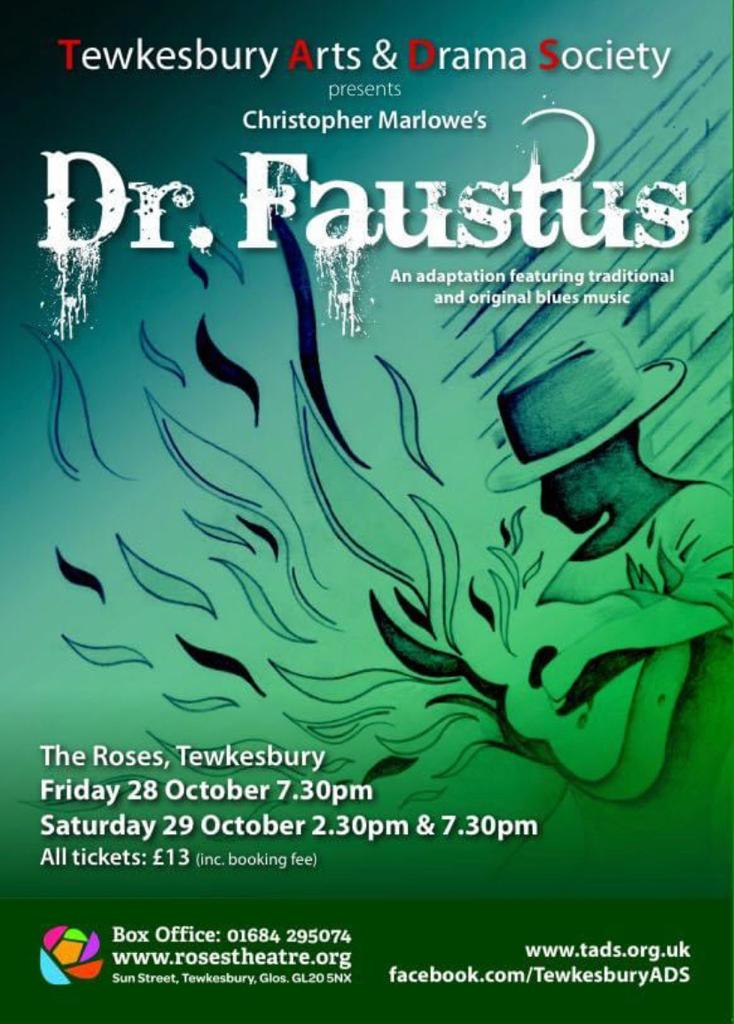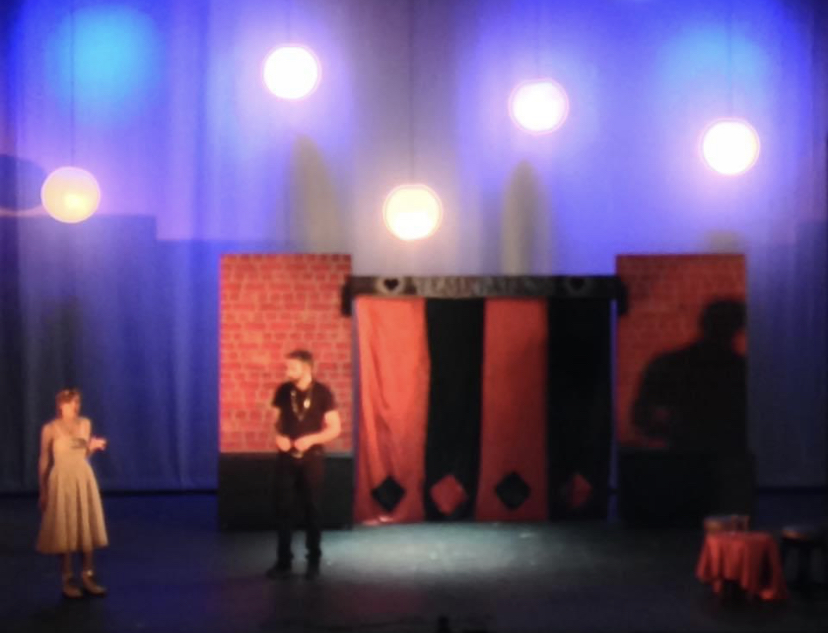


Our modern-day Faustus sold his soul to the devil in exchange for – what? This exciting production followed the tragic hero, played by local musician Ian Bishop, on his rise from lowly busker to celebrity chart-topper, featuring blues tracks and original music performed by the cast. The temptation of fame and wealth was Faustus’ flaw and led to his drug-induced downfall.

Like Shakespeare, Christopher Marlowe’s work was written to be performed, and, given its intricacies and ambiguities, the language is open to interpretation. These two ingredients enabled me to update the production and show the temptation of fame, fortune and drugs as modern day devils. Ian Bishop, the lead, also wrote several beautiful original songs to be included in the production, which greatly enhanced the performance. Thank you to all involved.
Oonagh Hughes, Director
Independent Report on TADS ‘Dr Faustus’ from Jarek Adams:
Monday 31st October, 2016
The Play – Dr Faustus
Marlowe’s Faustus is on the surface a play about greed and temptation, but deepens to explore sin and redemption. Faustus is given free will to choose his destiny, but made sympathetic to audiences as his desire is initially that of a scholar for more knowledge. His deal with the devil is a theme we all understand if not condone, and audiences both today, and in the late 16th and early 17th century would have known that this would lead to his destruction. So it is ultimately a moral tale warning of the result of selling your soul in exchange for earthly delights. Written in a time when religion would have played a much stronger part in all people’s lives, its central theme is still relevant today as we see people’s desire for fame and fortune outweighing that for accepting life as it is. Transferring the play to a modern-day story of a struggling musician willing to do anything for fame, the TADS production attempted to make the story more relevant for modern audiences, and to some degree that decision worked.
The Set
The initial productions of this play would have used many complicated devices to take their audiences on a journey into another world. Resources always being limited for amateur productions I felt the TADS made good use of simple staging. The small screens on wheels that began as brick walls and then turned to form other settings were effective, and audiences always are pleased to see this kind of inventiveness. The first act was staged simply, but in act two a few more elaborate settings were created. Las Vegas was nicely conjured by casino signs being flown in, and the night club scene with the audience looking in through doors as if we weren’t allowed into this exclusive space was nice. But the stage at the Roses is very large, and I never quite felt that any of the sets filled the space. That meant that we were never quite taken into another world, but were always aware that what we were looking at was a stage set.
Costumes
There was nice colour co-ordination with red and black clothing worn by all at the start, and as the play developed some of the more extravagant gowns were suitably fantastic. The costumes definitely had a ‘designed’ look and it was clear that some thought had gone into their choosing and that fun had been had creating the overall look. The masque section with the 7 deadly sins was nicely done, and I particularly liked the nice touch of Faustus wearing a ‘Damned’ T-shirt at the beginning. I felt that the costume design showed a good understanding of the characters and gave a suitably fantastic spectacle for the audience.
Lighting/sound
Overall there were some nice uses of lighting. However, there was a dark zone at the front of the stage where faces were lost a few times during important speeches. Strobes were used a couple of times in the play but the effect didn’t really work as the choreography of the actor’s movements was slow and the jarring effect this lighting would have given didn’t quite come off. It looked as if the strobe lighting wasn’t coordinated with the action and just stuck in, when it could have given an interesting effect if used correctly. On a more positive note, there were several scenes when silhouette lighting was used and worked extremely well.
Recorded sound did drown out the dialogue a few times in act two and a balance needed to be found. There was also a brief problem at the start of the song sung by the young woman, but this was quickly sorted out. Balance on Faustus’ songs was a bit off at first and the actor’s voice was lost, but seemed to be adjusted as it went on. Levels in live amplified music need to be spot on or the impact is lost. Vocally several of the younger actors were weak and I overheard discussion about this amongst the audience at the interval. Subtle use of ambient mikes can help with quiet voices without making the production sound too amplified.
Video projections – I can see why the decision was made to use these and the videos looked great, but I had a number of reservations about them.
Using the actor who played Faustus for the good and evil angels made it seem a bit of a one man show, as if the whole production had been built around him and not an ensemble piece. It was a bit stilted as the actor had to wait to fit his ‘live’ lines around the recorded ones. Seeing and hearing the projectors powering up and down was distracting.
I missed some of the images of dead pop stars as it was difficult looking right and left and catching them as they flashed by.
Production
This is a difficult play to bring to the stage, so an ambitious project for TADS to take on. I was drawn in by the opening scene of the down on his luck musician busking in the street, and the idea of modernising Faustus to a struggling musician worked well for me at first as it seemed logical for today’s audiences. It also struck a note, as everyone with a creative streak must sometimes consider taking a devil’s deal to achieve the success they desire. But as the production unfolded it seemed that the decision was based more on the lead actor’s abilities as a singer/songwriter, and felt like a bit of a one-man-showcase, and in changing Faustus journey to one of music rather than magic some of the wonder of the play was diluted for me.
My overall feedback is that the production felt underpowered. The cast seemed uncomfortable with the language and delivered stylised performances rather than naturalistic, which occasionally felt stilted. The night I saw the play (Friday) there was a fairly small audience, and this often causes companies of actors to have low energy, but this has to be overcome, and energy in the second act did pick up a bit. But there was perhaps too much reverence for the material, and the director could have kept the language, but found an energy in the piece, which is after all a dizzying journey to the peak of gratification followed by a fall to the depths of despair, and neither of these peaks were fully reached in this production. Audiences were said to have been driven insane by the original production of this play, but what was presented by TADS was an amiable story of one man’s folly. That is perhaps rather harsh criticism of a production that the audience generally enjoyed. I listened to people talking during the interval and after the performance and their feedback was extremely positive. But what was missing for me was the magic and the passion. The piece was rather static and the pace didn’t vary enough. Scenes like the seven deadly sins were fun, but could have moved more. This is a very physical play, but there was too much standing and speaking – more movement like the dancing in the nightclub scene could have brought more life to the piece. If the energy had moved more from quiet introspection to ecstatic hedonism and then plunged into the depths of despair the audience would have been taken on the rollercoaster ride that Faustus’ journey should be.
What did work well were the comic relief scenes, as they provide a bizarre distraction to the unfolding tragedy. These were nicely played out and bringing them into the auditorium lifted the attention of the audience.
The live music was excellent, and it’s clear you have several strong singers, but it would have been good if this had been more integrated into the production.
Acting
lan Bishop as Faustus was convincing as a struggling musician, but lacked the hunger for success that Faustus should have shown. His singing and musicianship was fabulous, and physically his height gave him great presence on stage. But I wanted more passion from him and more energy. His character could have changed much more throughout the play as Faustus’ journey is a gift for any actor, allowing them to play a huge range of emotions, which I didn’t feel lan fully committed to. I felt his choice to play it cool worked for the audience, but if he’d grasped the desperate struggle Faustus experiences his portrayal could have been much more dynamic.
Geoffrey Guy as Mephistopheles played the part as a mysterious spirit guide, and although this worked, it missed the struggle that this character has at its heart. Mephistopheles is an untrustworthy character – on one hand hungry to claim the soul his master (or mistress) sent him to collect, but on the other hand constantly trying to warn Faustus of the consequences of his choices. I’m glad Geoffrey was not tempted to go down the route of devilish foolery, but through his stillness I feel he could have conveyed more of the heavy sorrow Mephistopheles carries as he draws Faustus towards his fate.
Ali Baxter playing Wagner was perhaps a little bit too cool as Faustus servant, but along with Geoff Matthews as Robin, gave a few suitably bizarre comic turns, which gave the audience a nice change of pace. Ali’s character seemed to echo that of lan Bishop’s Faustus as a struggling musician, but his role in his master’s demise wasn’t fully developed in this production. He played both cool and comic, which for a relatively minor roll didn’t quite work. If he’d gone for one or the other and really sunk his teeth into that he could have shone in his role.
Back to Geoff Matthews, his odd little turns were a delight. He grabbed the audience’s attention and enjoyed lingering on the stage soaking up the giggles without hamming up his part in any way. When partnered with Catherine Megan Russell, who seemed unsure of her lines at the start of act two, he once again lifted the energy and engaged the audience superbly. Catherine seemed a bit lost playing Dill, but the director did well casting to individual strengths, and Dill’s dizziness worked well.
Playing multiple minor roles is always a challenge, and Peter Asphar did well, although his characters were not really different enough and perhaps a little stiff – BUT he did try to play Valdes and LB Of France naturalistically rather than mannered, but as with other members of the cast I felt he wasn’t completely comfortable with the text.
Jane Calvert as Cordelia and Gluttony shone out as relaxed and confident on the stage. She seemed comfortable with the text and had a good stage presence. I hope I have this right that she was also the singer in act two who did the slowed down version of Toxic, which was lovely.
Jane Hughes made the most of her role as Lucifer and it was a nice touch seeing this role played by a woman. As with Pam Jell as Caesar and Beelzebub, it worked well switching these roles to women, but I felt Pam played her parts a little bit too stately and serenely, and this slowness made it seem as if she was struggling with the text rather than what was perhaps an acting choice.
Robert Starling seized his brief role as Raymond, and other minor and multiple roles were performed well by Evie Calvert, Philippa Devine, Diana Palmer and Nancy Spanner. Although as I’ve already mentioned, vocally some of the younger actors were underpowered, and this wasn’t helped by the sections where actors wore masks. Where actors are unable to produce volume the opportunity arises to use physicality to convey their part, but in general I felt that quite a few of the actors were a bit unsteady with the language in the play and weren’t able to relax into their parts because of this. In general however, the play was nicely cast by Oonagh Hughes, allowing the members of her company to work to their strengths, but as stated before I would have liked to see a more rounded production that didn’t feel as if it had been created around the main actor’s talents.
Dramatic Achievement
Despite the list of criticisms above (but of course that’s what you’ve asked me to provide), I did enjoy the production. It was a bold choice of script to stage, and I applaud the fact that you chose to bring it up to date with the storyline of the musician. If I had felt the cast committing to the play more, and the lead characters playing their parts with more passion you would have fully pulled it off for me. But my overall criticism was that it lacked energy, which is the key to lifting a pleasant evening of theatre to a thrilling night of drama. This is one of my favourite plays of all time as it is pure drama from the beginning where we see Faustus make his choice, through to the heady dizziness of getting everything he thinks he desires, and ending with the realization of what he has done. This is a play that demands spectacle which could have been conveyed through the performances, however TADS made a good stab at this play but never quite hit the highs or lows. Having the safety net of an audience who are often made up of friends and family can lead amateur companies to underachieve as they know their audience is predisposed to like their efforts. But the thing that lifts any performance to being something special is a desire from the company to achieve something more, and I didn’t quite feel that was the goal with this production.















